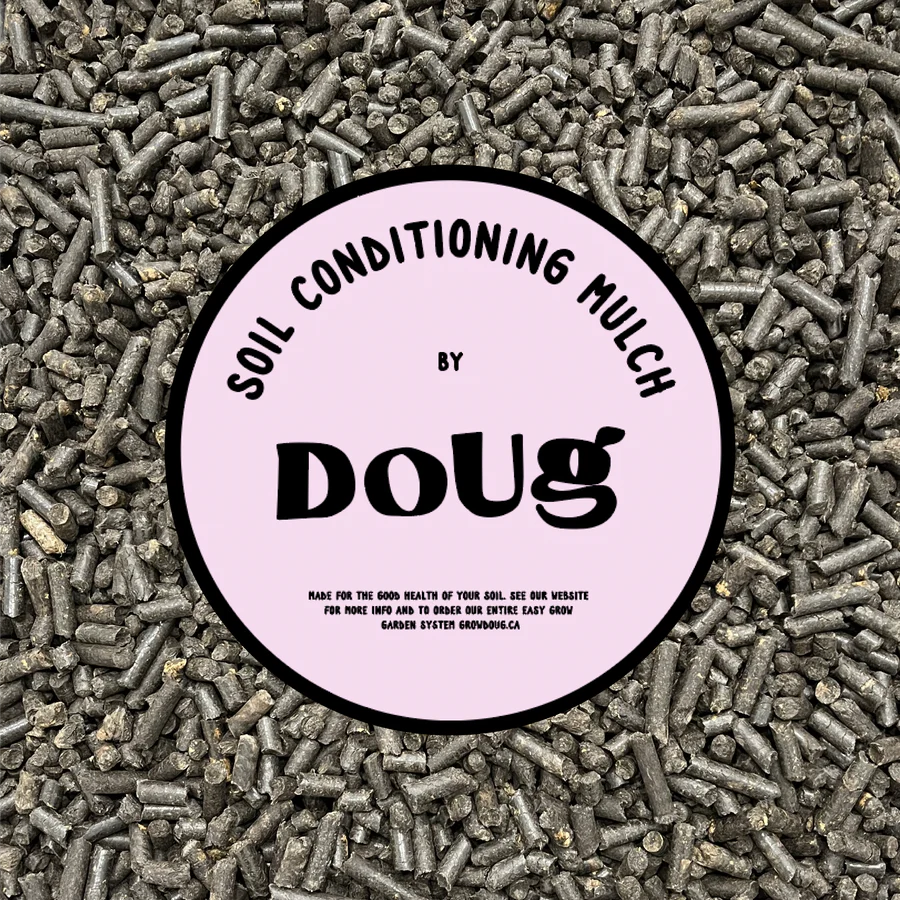Mulching is ubiquitous with gardening. Mulching is a very effective way to reduce the total workload that we need to put into our garden. Most mulches on the market today focus on reducing weed growth but don’t take into consideration their detriments to the soil. We at Doug Gardens believe that mulch should both help us as gardeners and contribute to the health of our soils. We believe that the earth will be on its way to recovery when the quality of the mulch becomes a status symbol among gardeners.
Before we introduce you to our garden mulch, we will break down 4 popular garden mulches available:
1. Wood Chip Mulch: Wood chips or bark mulch is probably the most common “organic” mulch. It is a cheap and fairly aesthetically pleasing mulch product. Looks though, can be deceiving. A ton of the wood mulch that is found in garden centers or big box stores is made from shredding pallets. Although this seems like a great way to be environmentally friendly, pallets can be extremely environmentally unfriendly. When pallets cross international borders, they are often sprayed with chemicals to control possible pests that could be in the wood. When spread into your garden, you are unknowingly spreading wood that will leach the chemicals contained in the wood pores into your gardens. Not awesome.
Wood mulch also has other negatives like altering soil pH, depleting and tying up soil nitrogen, encouraging pests and diseases (no one likes slugs in their lettuce) and impeding water flow into the soil. On top of this, it takes forever to break down.
2. Plastic or Fabric Weed Mat: Weed mat is another popular choice in gardens to stop weed growth. Left alone, weed mats might be the most unsightly mulch choice for a garden. After just one growing season, your weed mat will start to break down, leaving a complete mess in your garden. As the plastic matting breaks down, it will leave micro and macro plastics and begin to release harmful chemicals into your soil.
Both plastic and fabric weed mats also restrict air and water infiltration and evaporation of the soil leading to a much bigger problem then the weeds would have ever given.
3. Long Cut and Short Cut Straw Mulch: Straw is actually not the worst option, as long as you realize that not all straw is created equally. Straw is the dried stalks that remain after grain has been harvested. It is usually in long strands that do a good job of soil moisture retention and weed growth reduction. Straw can be very detrimental to your garden if you use straw that has residual herbicide residue on it. Non-sprayed/desiccated straw is very hard to find, as conventional agriculture often sprays a wheat crop before harvesting to produce a ‘dead’ plant that is dry and therefore can be processed quicker.
Further problems with using a long strand straw is that it can appear quite messy in the garden and wind can very easily blow the straw around in your backyard.
Chopped straw is better, but can create a mat on the soil surface that can impede soil moisture evaporation thus creating inefficient soil conditions.
Straw is also allelopathic meaning that it releases a chemical that inhibits the growth of plants. This is a really great thing if you're trying to stop growth of weeds but can be very detrimental if you want to germinate your vegetable seeds.
4. Straw Pellets Mulch: Straw Pellets are becoming more and more popular because they can be shipped much easier than bulky long/short cut straw. Straw pellets are extremely effective at stopping weeds, holding moisture in, and adding organic matter in the soil. The problem, and one that we at Doug Gardens can speak to from experience, is that it does all of these things too good.
When straw pellets are laid over your garden they look nice and compact. Give it some water and you have a whole different product on your soil’s surface. The straw pellets rapidly expand and grow. Each time they are watered in the beginning of the season, they continue to expand.
The key with straw pellets is that less is more. In our first version of our garden kits, we included a 20lb bag of pellets for a 18 sq.ft garden. 20 lbs. of straw pellets turned out to be about 15 lbs. too much. The 20lbs of straw pellets created a 6” layer of allelopathic straw to the garden systems. The thick layer of straw also wouldn't let the soil breath the way it needed to and we were left with a problem.

The straw pellet problem was a blessing in disguise however. We realized we needed to develop a soil conditioning system with our mulch. And so, the Doug Soil Conditioning Mulch was born.
We knew that we wanted our mulch to do four things:
- Protect the soil: We wanted our mulch to protect the soil from erosion, water evaporation, give the soil the breathability it needs and reduce weed pressure.
- Feed the soil: We wanted the mulch to be the antithesis of the mulches that are readily available. As the mulch broke down over the growing season, we wanted our mulch to feed the soil microbes, build soil structure and provide an overall net positive result for the garden soil.
- Breakdown in one season: This is important because the longer a mulch takes to break down, the more it will begin to cause the gardener problems in the years forthcoming.
- Made from Environmentally Friendly and Regenerative Ingredients: We wanted to ensure that our mulch could be built with primarily agricultural waste products.
What we created in our Soil Conditioning Mulch is an ultra-premium mulch product that is the first of its kind and an absolute must-need for anyone that wants to grow healthy garden systems and vegetables.
Find more information about our Soil Conditioning Mulch, its ingredients and to buy a bag or two by visiting:
https://growdoug.ca/collections/all-products/products/dougs-mulch

